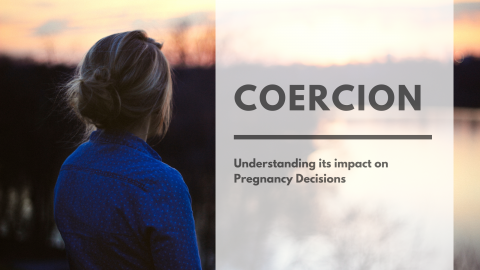
Over my years of working at Mea Centre I have heard many stories from women, before, during and after their pregnancy of the pressures they felt when they were making their pregnancy decision. Many have commented that they had family members, friends, their partner, school counsellors and even health care professionals who were telling them they should choose one option over the other. Such a situation, where someone tries to influence a pregnancy decision, is referred to as coercion. Coercion can take many different forms and can be challenging to detect.
What is Coercion?
Coercion is a subtle and manipulative behavior that is intended to influence someone to make a specific decision they may not otherwise have made. This could involve emotional or psychological pressure, physical force, or threats that instill fear in the individual, creating uncertainty and doubt and ultimately influencing their ability to decide freely. Coercion in situations around pregnancy often focuses on directing the individual towards a decision that reinforces the agenda of the person coercing, rather than what the individual may want for themselves.
Recognizing the Dynamics of Coercion
Coercion can manifest itself in many covert and overt ways, including but not limited to:
- Threatening language or behavior directed towards someone
- Pressuring an individual to act or decide faster than they are comfortable with
- Manipulating an individual's emotions by using guilt or shame
- Using physical force or intimidation to achieve compliance
- Withholding information or giving false or misleading information to push someone into a specific decision
Impacts of Coercion on Pregnancy Decision-Making
Coercion is a violation of the individual's right to autonomy, a core principle of healthcare and human rights. Incidences of coercion around pregnancy decisions, such as continuing an unintended pregnancy or terminating a pregnancy, can significantly impact one's decision-making process. It would even have a long-lasting impact on the individual's physical, psychological, and emotional well-being.
When an individual experiences coercion, they may feel pressured or forced to make a decision that does not align with their values, beliefs, or life plans. Such moments instill a feeling of powerlessness, fear, and low self-worth, which can lead to negative life outcomes. Furthermore, for those experiencing coercion around pregnancy decisions, a lack of access to unbiased resources that provide comprehensive information further fuels their vulnerability.
Seeking Help and Support
Coercion is seldom easy to recognize, making intervention difficult. If you find yourself feeling doubtful or uncomfortable about your decision concerning a pregnancy, it is essential to seek help and support. Seeking help can make all the difference. It is crucial to ensure that all options concerning the pregnancy are discussed in an objective way, and that you ultimately make your own choice based on your own informed decision-making process.
This is why Mea Centre exists, to give women access to information about all their options in a safe, non-judgemental, and confidential space. We give you all the information and resources you need to make an informed decision. We know it can feel overwhelming to have people giving their opinions of what they think you should do. We provide a space to escape the noise so you can listen to your heart about what YOU want to do with your pregnancy.
Over the years I have met with many women who gave into coercion and made a pregnancy decision even when it went against their own desires or beliefs. No one should feel forced to do something they don’t want to do. If you have experienced coercion, our support workers are here for you.
Contact us to make a confidential appointment.
By: Elizabeth, Executive Director
Sources:
- Women's Web. (2019). Coercion in Pregnancy Decisions: How and Why Women Get Coerced.
- Reproductive Coercion: A Systematic Review - PMC (nih.gov)
